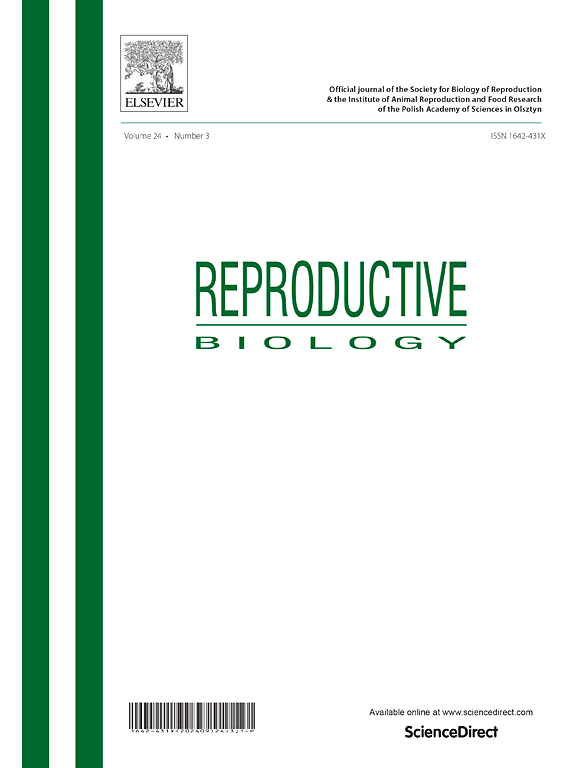Tributyltin affects the growth of ovarian granulosa cells in polycystic ovary syndrome by upregulating YY1-mediated CDKN1C via the PI3K/AKT pathway
IF 2.5
3区 生物学
Q3 REPRODUCTIVE BIOLOGY
引用次数: 0
Abstract
Polycystic ovary syndrome (PCOS) poses a significant threat to women's fertility and quality of life. Studies have found a close association between the environmental contaminant tributyltin (TBT) and the occurrence of PCOS. The main objective of this study was to investigate the specific mechanisms by which TBT adversely affects the growth of ovarian granulosa cells. Cell viability, cycle, proliferation, and apoptosis were measured by 3-(4, 5-dimethyl-2-thiazolyl)-2, 5-diphenyl-2-H-tetrazolium bromide (MTT), 5-ethynyl-2’-deoxyuridine (EdU), and flow cytometry. Simultaneously, lactate dehydrogenase (LDH) leakage and Caspase-3 activity were measured by the corresponding kits. Besides, western blot was used to analyze the protein levels of cyclin-dependent kinase inhibitor 1 C (CDKN1C) and the transcription factor Yin Yang 1 (YY1). TBT severely impaired the viability, cell cycle, and proliferation capacity of granulosa cells, and induced their apoptosis. Silencing CDKN1C and YY1 alleviated the damage caused by TBT to the cells, but these repair effects were weakened by CDKN1C overexpressed. By inhibiting the phosphatidylinositol 3-kinase/protein kinase B (PI3K/AKT) signaling pathway, TBT upregulated the YY1-mediated CDNK1C, and further exacerbated the damage to granulosa cells. This study revealed the mechanism that TBT induced the loss of ovarian granulosa cells in PCOS patients by upregulating YY1-mediated CDKN1C expression, which provided new ideas and targets for the pathogenesis and treatment of PCOS.
三丁基丁通过PI3K/AKT通路上调yy1介导的CDKN1C,影响多囊卵巢综合征卵巢颗粒细胞的生长
多囊卵巢综合征(PCOS)严重威胁妇女的生育能力和生活质量。研究发现环境污染物三丁基锡(TBT)与多囊卵巢综合征的发生密切相关。本研究的主要目的是探讨TBT对卵巢颗粒细胞生长不利的具体机制。采用3-(4,5 -二甲基-2-噻唑基)- 2,5 -二苯基-2- h -溴化四唑(MTT)、5-乙基-2 ' -脱氧尿苷(EdU)和流式细胞术检测细胞活力、周期、增殖和凋亡。同时用相应的试剂盒检测乳酸脱氢酶(LDH)渗漏量和Caspase-3活性。western blot检测细胞周期蛋白依赖性激酶抑制剂1 C (CDKN1C)和转录因子阴阳1 (YY1)蛋白水平。TBT严重损害颗粒细胞的活力、细胞周期和增殖能力,诱导颗粒细胞凋亡。沉默CDKN1C和YY1可减轻TBT对细胞的损伤,但这些修复作用因CDKN1C过表达而减弱。TBT通过抑制磷脂酰肌醇3-激酶/蛋白激酶B (PI3K/AKT)信号通路,上调yy1介导的CDNK1C,进一步加重对颗粒细胞的损伤。本研究揭示了TBT通过上调yy1介导的CDKN1C表达诱导PCOS患者卵巢颗粒细胞丢失的机制,为PCOS的发病机制和治疗提供了新的思路和靶点。
本文章由计算机程序翻译,如有差异,请以英文原文为准。
求助全文
约1分钟内获得全文
求助全文
来源期刊

Reproductive biology
生物-生殖生物学
CiteScore
3.90
自引率
0.00%
发文量
95
审稿时长
29 days
期刊介绍:
An official journal of the Society for Biology of Reproduction and the Institute of Animal Reproduction and Food Research of Polish Academy of Sciences in Olsztyn, Poland.
Reproductive Biology is an international, peer-reviewed journal covering all aspects of reproduction in vertebrates. The journal invites original research papers, short communications, review articles and commentaries dealing with reproductive physiology, endocrinology, immunology, molecular and cellular biology, receptor studies, animal breeding as well as andrology, embryology, infertility, assisted reproduction and contraception. Papers from both basic and clinical research will be considered.
 求助内容:
求助内容: 应助结果提醒方式:
应助结果提醒方式:


